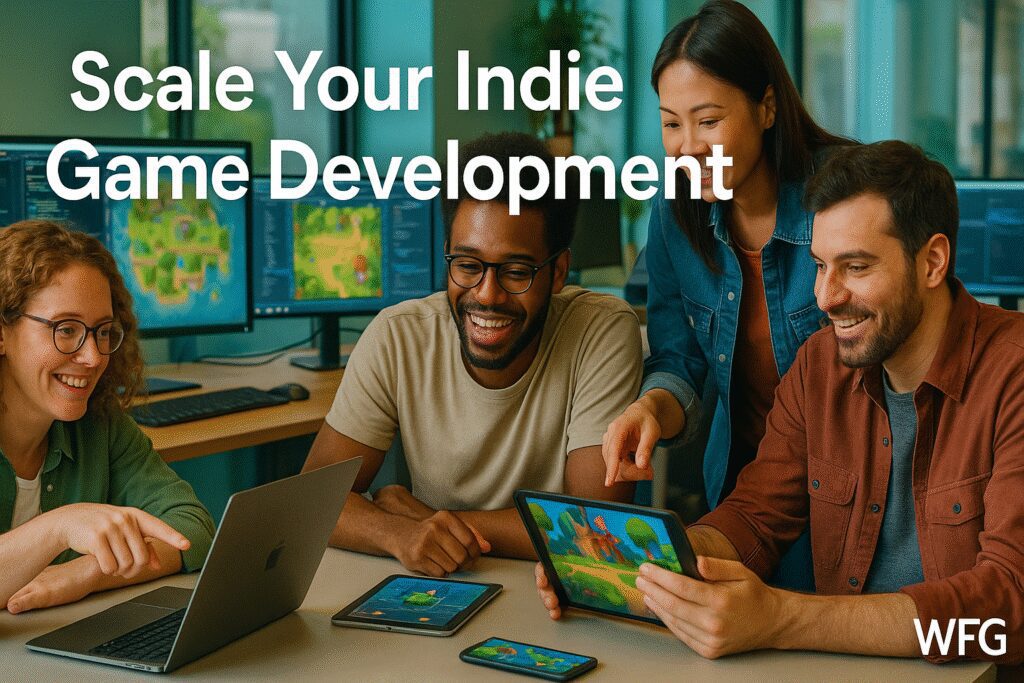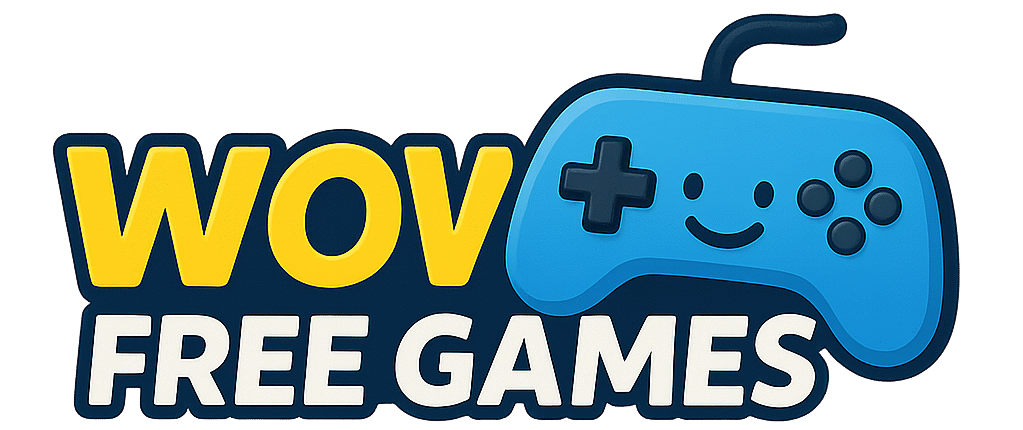Mobile game development services represent the bridge between your indie passion project and professional market success. Every independent developer reaches that pivotal moment when their homegrown approach hits an invisible wall – when the game that started as a weekend hobby suddenly demands expertise, resources, and scale beyond what any single person can manage.

The gaming industry doesn’t wait for developers to figure things out. While you’re wrestling with optimization challenges or struggling to implement that multiplayer feature, competitors are launching polished experiences that capture your potential audience. This reality forces a crucial decision: remain small and limited, or evolve into something bigger by strategically leveraging external expertise.
Professional mobile game development services offer more than just additional manpower – they provide specialized knowledge, proven workflows, and the operational infrastructure needed to compete in today’s demanding marketplace.
The Psychology of Scaling: Overcoming the “Solo Developer” Identity
The hardest part of scaling isn’t technical – it’s emotional. Most indie developers started creating games because they loved having complete creative control. Every line of code, every sprite, every sound effect reflected their personal vision. The thought of handing over pieces of that creation to strangers feels like betraying everything that made you fall in love with game development.
This psychological barrier runs deeper than simple control issues. When you’ve built everything yourself, your game becomes an extension of your identity. Collaborating with mobile game development services can feel like admitting your limitations or compromising your artistic integrity. Many developers worry that external partners will dilute their vision or transform their unique creation into generic commercial product.
The reality requires a fundamental mindset shift. Professional collaboration doesn’t diminish your creative role – it amplifies it. Instead of spending 80% of your time on technical implementation and 20% on creative decisions, working with skilled service providers flips that ratio. You become the creative director, the visionary leader who guides talented specialists toward realizing your complete artistic vision.
Free Bingo Win Real Money: The Mobile Apps Changing How We Play
Think of acclaimed film directors who don’t operate cameras or edit footage themselves, yet maintain complete creative control over their projects. The same principle applies to game development. Your role evolves from implementer to orchestrator, which actually increases your creative impact rather than reducing it.
Understanding Your Scaling Readiness
Recognizing when you need mobile game development services requires honest self-assessment. The signs often appear gradually, then suddenly become undeniable. Your development timeline keeps stretching as you encounter technical challenges outside your expertise. Features you envisioned months ago remain unimplemented because you lack the specialized knowledge to execute them properly.
Market pressure intensifies this situation. Players expect console-quality experiences on mobile devices. They want seamless multiplayer, stunning graphics, cross-platform compatibility, and regular content updates. Delivering these expectations as a solo developer or tiny team becomes virtually impossible without external support.
Common scaling bottlenecks include performance optimization for different devices, implementing complex networking systems, creating professional-grade artwork, handling platform-specific requirements, and managing post-launch support. Each bottleneck represents an opportunity to leverage specialized mobile game development services rather than spending months learning new skills.
The key indicator for scaling readiness isn’t just technical limitations – it’s opportunity cost. When you’re spending weeks trying to solve problems that experts could handle in days, you’re sacrificing time that could be invested in core creative decisions, marketing, or developing your next project.
Types of Mobile Game Development Services for Scaling Indies
Modern mobile game development services encompass far more than basic programming support. Technical enhancement services focus on optimizing your existing code, improving performance across different devices, and implementing advanced features that require specialized expertise. These services prove invaluable when your game runs perfectly on your development device but struggles on older hardware or different screen sizes.
Specialized expertise services bring cutting-edge capabilities to your project. AI integration, sophisticated multiplayer systems, augmented reality features, and advanced graphics techniques require deep technical knowledge that takes years to develop. Rather than attempting to master these complex domains yourself, partnering with specialists allows you to incorporate professional-grade features without the learning curve.
Production support services handle the often-overlooked aspects of game development that consume enormous amounts of time. Quality assurance testing across multiple devices, localization for different markets, platform-specific optimization, and compliance with various app store requirements. These services ensure your game meets professional standards without requiring you to become an expert in each area.
Post-launch services address the reality that successful games require ongoing support. Analytics implementation, content updates, bug fixes, community management, and performance monitoring become full-time responsibilities as your player base grows. Mobile game development services can handle these operational aspects while you focus on creative expansion.
The Strategic Approach to Service Integration
Successful scaling requires strategic thinking about which services to integrate and when. The goal isn’t to outsource everything – it’s to augment your capabilities in areas where external expertise provides the greatest value. Start by identifying your strongest skills and biggest weaknesses. If you excel at game design but struggle with technical implementation, prioritize technical services. If you’re a strong programmer but weak at art, focus on creative services first.
Phased implementation works better than attempting to integrate multiple service providers simultaneously. Begin with your most critical bottleneck, establish effective working relationships, then gradually expand to additional services. This approach allows you to maintain control over the process while building confidence in collaborative development.
Maintaining your indie identity during this transition requires clear communication about your vision and non-negotiable creative elements. Professional service providers understand that their role is supporting your vision, not replacing it. Establish clear creative guidelines, provide detailed design documents, and maintain regular communication to ensure external work aligns with your artistic goals.
Cost-Effective Scaling Strategies
Budget planning for mobile game development services requires balancing immediate needs against long-term goals. Rather than viewing these services as pure expenses, consider them investments in your game’s market potential. A few thousand dollars spent on professional optimization or multiplayer implementation could mean the difference between a hobby project and a commercially successful title.
ROI considerations extend beyond immediate financial returns. Time saved by leveraging external expertise can be reinvested in marketing, community building, or developing additional content. The opportunity cost of spending months learning new skills often exceeds the cost of hiring specialists who can implement solutions quickly and correctly.
Hybrid approaches offer the most flexibility for budget-conscious developers. Handle aspects you excel at internally while outsourcing specific challenges to specialists. This strategy maximizes your budget efficiency while ensuring professional quality in areas beyond your expertise.
Vetting and Selecting the Right Mobile Game Development Services
Choosing service providers requires careful evaluation beyond simple cost comparisons. Portfolio quality provides the most reliable indicator of capabilities. Look for providers who have worked on games similar to yours in scope, style, and target audience. Generic mobile app development experience doesn’t necessarily translate to game development expertise.
Communication style and cultural fit matter enormously for successful collaboration. During initial consultations, pay attention to how well providers understand your vision and whether they ask thoughtful questions about your creative goals. Technical competence without good communication often leads to disappointing results.
Red flags include providers who make unrealistic promises about timelines or costs, lack detailed portfolios, or seem more interested in selling services than understanding your specific needs. Professional service providers should provide clear contracts, regular progress updates, and transparent pricing structures.
Managing the Transition Process
Successful collaboration with mobile game development services requires establishing clear workflows and communication protocols. Define deliverable expectations, review schedules, and quality standards upfront. Regular milestone reviews ensure projects stay on track and meet your creative vision.
Project management becomes crucial when coordinating multiple external providers. Consider using collaboration tools that allow real-time progress tracking and centralized communication. Clear documentation prevents misunderstandings and ensures everyone works toward the same goals.
Quality control remains your responsibility regardless of which services you outsource. Establish testing protocols, provide detailed feedback, and maintain final approval authority over all deliverables. Your role shifts from implementation to oversight, but maintaining quality standards remains essential.
Common Pitfalls and How to Avoid Them
Over-reliance on external services represents a significant risk for indie developers. While leveraging expertise makes sense, maintaining core capabilities ensures you retain creative control and operational flexibility. Build internal knowledge even when outsourcing specific tasks.
Scope creep and budget overruns occur when project requirements aren’t clearly defined upfront. Combat this by creating detailed specifications, establishing fixed-price contracts where possible, and requiring approval for any changes to original agreements.
Perhaps the most critical pitfall involves losing sight of your original game vision during collaborative development. Regular creative reviews, clear style guides, and frequent communication help ensure external work enhances rather than dilutes your artistic vision.
Frequently Asked Questions
How much should I budget for mobile game development services?
Budget allocation depends on your specific needs and game complexity. Technical optimization typically ranges from $3,000-$15,000, while specialized features like multiplayer can cost $10,000-$50,000. Start with your biggest bottleneck and budget 20-30% of your total development budget for external services.
When is the right time to start using mobile game development services?
The optimal timing occurs when development bottlenecks prevent progress on core creative elements. If you’re spending more time solving technical problems than designing gameplay, it’s time to consider external expertise. Earlier integration often proves more cost-effective than trying to fix issues after development completion.
How do I maintain creative control when working with external services?
Creative control requires clear communication, detailed documentation, and regular review processes. Provide comprehensive design documents, establish approval workflows, and maintain regular communication with service providers. Professional teams expect and respect creative direction from clients.
Browser Games RPG Free No Download: The Best Adventures You Can Play Instantly
What’s the difference between mobile game development services and general app development?
Game development requires specialized knowledge of graphics optimization, real-time systems, user engagement mechanics, and platform-specific gaming requirements. General app developers often lack the specific expertise needed for successful game implementation, making specialized game development services essential for quality results.




Pingback: earn money through game streaming